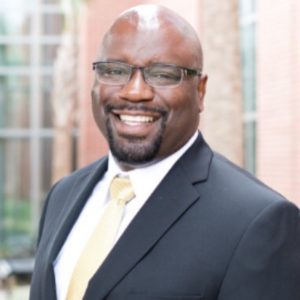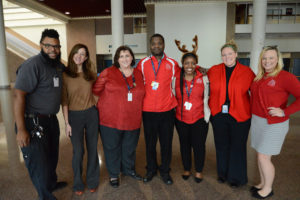Facility Manager Senior Editor R.V. Baugus Completes Book To Honor Wife Tanya’s Legacy
Facility Manager Senior Editor R.V. Baugus has written a book about his wife, Tanya, who passed away suddenly almost three years ago at age 48 during a day surgery procedure. The book Saint, Servant, Soulmate: The Loving Legacy of Tanya Baugus, is now available to order from a website established for Tanya at www.honoringtanyabaugus.com.
Your purchase of this book supports the Tanya Baugus Memorial Scholarship Fund at her employer Coaches Outreach. The Scholarship was the idea of Coaches Outreach founder Tommy Maxwell to honor the legacy and memory of Tanya while at the same time using donations to the scholarship to enable coaching couples the opportunity to afford one of the Coaches Outreach summer marriage retreats. As the event coordinator, Tanya was present at every marriage retreat and welcomed all couples whether she knew them or not with open arms and a loving heart for the weekend they were about to enjoy. Tanya loved these special weekends in the summer to see couples grow closer together in their marriage and in their spiritual walk.
Thank you for remembering Tanya and giving her great joy in heaven by knowing that your purchase goes to one of her greatest passions in the Coaches Outreach marriage retreats.
Daktronics To Provide Improved Visual Experience For Angel Stadium
Daktronics announced a continued partnership with the Los Angeles Angels of Anaheim to bring 14 LED displays totaling more than 23,000 square feet to the venue for the 2018 season.
“While putting a perennial contender on the field remains a top priority, the fan experience is very important to Angels Baseball,” said Angels  Club President John Carpino. “We believe this investment into Angel Stadium will dramatically enhance the overall experience for our loyal and dedicated fan base, and look forward to unveiling this technology at the start of the 2018 Season.”
Club President John Carpino. “We believe this investment into Angel Stadium will dramatically enhance the overall experience for our loyal and dedicated fan base, and look forward to unveiling this technology at the start of the 2018 Season.”
The new right field video display will be the third largest in Major League Baseball at 9,500 square feet. It will feature 7.7 million LEDs and would take a total of 890 60-inch televisions to cover the entire display. The new display in left field will measure 5,488 square feet. Both displays will feature 13HD pixel layouts and 11,000 nits of brightness, the industry-leading solution for outdoor stadium technology, to bring excellent image clarity and contrast to fans in every seat.
The project upgrades Daktronics technology that has been operating since its installation in 2004. With the new project, a total of 17.1 million LEDs will light up to improve the fan experience in and around the stadium.
“We’re excited to continue our long-standing partnership with the Los Angeles Angels for this upcoming stadium-wide installation,” said Daktronics President and CEO Reece Kurtenbach. “We’re proud to continue developing the best video solutions for our customers in the world of sports and beyond. Our customers have high expectations for our products and we look forward to meeting and exceeding their expectations for years to come.”
Marcus “Chip” Murrell Named GM At Rocky Mount Event Center
Marcus “Chip” Murrell has been appointed general manager for the Rocky Mount (NC) Event Center, a Sports Facilities Management, LLC managed facility.
Murrell brings over 15 years of experience in the event industry to Rocky Mount, with his most recent duties as an operations director for the Columbia Metropolitan Convention Center in Columbia,  S.C. and the James L. Knight Center in Miami, Fla. Murrell’s responsibilities included leading the day-to-day back of house venue operations, leading his events team in the planning and implementation of all events, creating and successfully meeting annual budgets, maintaining inventory, and overseeing all service management agreements with outside vendors. As general manager for the Rocky Mount Event Center, Murrell will be responsible for managing all aspects of the pre-opening and operations of the facility scheduled to open fall 2018.
S.C. and the James L. Knight Center in Miami, Fla. Murrell’s responsibilities included leading the day-to-day back of house venue operations, leading his events team in the planning and implementation of all events, creating and successfully meeting annual budgets, maintaining inventory, and overseeing all service management agreements with outside vendors. As general manager for the Rocky Mount Event Center, Murrell will be responsible for managing all aspects of the pre-opening and operations of the facility scheduled to open fall 2018.
Murrell is a graduate of Winston Salem State University with a bachelor’s degree in Sports Management: Management and Administration. He is also a graduate of the IAVM Venue Management School and is currently an active member of IAVM and the Event Service Professionals Association (ESPA). In 2015, Murrell earned the Employee of the Year Award with the Midlands Authority for Conventions, Sports and Tourism.
Murrell began his duties on November 23.
New Orleans Ernest N. Morial Convention Center Employees Deliver Holiday Cheer To Families At The Ronald McDonald House Of New Orleans
Santa’s elves brought plenty of smiles to small faces as they delivered a hefty sack of toys to The Ronald McDonald House of New Orleans. New Orleans Ernest N. Morial Convention Center employees donated money via payroll deductions to raise funds to buy toys and supplies for the young patients who are spending their Christmas in a hospital setting as they battle various illnesses, as well as toys for their siblings, and gift cards and toiletry packs for the parents. The group also purchased items for the Ronald McDonald House, such as snacks, sheet sets, pillows, and flashlights.
Convention Center employees Kelli Zohar-Davis, Erin Oubre, Clair Lorell, Megan Clay, and Mildred Simon used their personal PTO hours to shop for toys at various local stores on Friday, December  15. The following week, on Tuesday, December 18, employees Nicole Newton, Maurice Jackson, Erik Gonzalez, Kelli Zohar-Davis, Cassie Jones, Megan Clay, Matthew Fryou, and AJ McCorkle distributed the toys and gifts to the families who reside at the Ronald McDonald House during treatment. Centerplate, the Convention Center’s exclusive food and beverage provider, generously donated 60 boxed lunches containing sandwiches, chips and fruit, plus cookies for a decorating activity.
15. The following week, on Tuesday, December 18, employees Nicole Newton, Maurice Jackson, Erik Gonzalez, Kelli Zohar-Davis, Cassie Jones, Megan Clay, Matthew Fryou, and AJ McCorkle distributed the toys and gifts to the families who reside at the Ronald McDonald House during treatment. Centerplate, the Convention Center’s exclusive food and beverage provider, generously donated 60 boxed lunches containing sandwiches, chips and fruit, plus cookies for a decorating activity.
“We are so grateful to the Convention Center employees who donated, shopped for, and delivered gifts and meals to the families staying in the House. It’s heartwarming to know that people care and took the time to make Christmas special for everyone,” said Brooke Stewart, Programs and Volunteer Coordinator Ronald McDonald House Charities of South Louisiana.
The Convention Center’s staff chose The Ronald McDonald House of New Orleans because of the organization’s commitment to improving the quality of life for families of seriously ill children.
The mission of the Ronald McDonald House Charities of South Louisiana is to provide a “home-away-from-home” to families of seriously ill children and to provide programs that give comfort, compassion, and care to children and their families. Parents with critically ill children are invited to bring their immediate family to stay in the Ronald McDonald House, free of charge, while their sick child receives treatment. The house provides a safe, homey place to stay, laundry facilities, and meals/snacks for the residents so that families don’t have to incur additional expenses and be separated during an already stressful time.
Kobe’s Retirement Ceremony Yields Record Sales At STAPLES Center’s Team LA Store
AEG Merchandise reported its third largest day of sales in STAPLES Center history, grossing more than $820,000 during Lakers Legend Kobe Bryant’s jersey retirement earlier this week at STAPLES Center in downtown Los Angeles.
As L.A. LIVE erupted with nearly 10,000 fans throughout the day for “Kobeland,” a free amusement-park style street fair prior to the Lakers vs. Golden State Warriors game, during which Bryant’s  No. 8 and No. 24 Lakers jerseys became the historic franchise’s 11th and 12th numbers to be retired and permanently displayed in the rafters of STAPLES Center, AEG’s three brick and mortar merchandise locations in Southern California collectively sold more than $670,000 in product.
No. 8 and No. 24 Lakers jerseys became the historic franchise’s 11th and 12th numbers to be retired and permanently displayed in the rafters of STAPLES Center, AEG’s three brick and mortar merchandise locations in Southern California collectively sold more than $670,000 in product.
“Having witnessed Kobe Bryant’s entire Lakers career, it was no surprise how many fans would want to acquire a piece of memorabilia to celebrate and remember one of the most remarkable careers in NBA history,” said Lee Zeidman, President, STAPLES Center and L.A. LIVE. “Kobe’s impact on the NBA, Los Angeles Lakers and fans everywhere may never be duplicated and it has certainly been our privilege to share so many great moments with him and his fans including last night’s celebration.”
Throughout the day AEG’s Team LA Store at STAPLES Center sold more than $600,000 with an additional $147,000 in online sales, while the New Era D Lab at L.A. LIVE sold nearly $40,000 in specially designed New Era caps and merchandise while the Los Angeles Lakers Team Shop, owned and operated by AEG, saw more than $20,000 in sales, generating $824,000 in sales.
“Through our understanding of Kobe Bryant’s influence on the Lakers organization, the City of Los Angeles and fans around the world, AEG teamed up with New Era, Nike, Kobe Inc. and Highland Mint to provide fans with high quality and collectible merchandise for this momentous occasion,” said Sean Ryan, vice president of merchandise, AEG. “Monday’s day-long tribute and overall phenomenal sales of the specially created items truly speak to the iconic legacy of Kobe Bryant.”
Do you want to receive a Front Row News weekly digest?
Categories
- Allied (861)
- Architecture (147)
- Arenas (747)
- Career (897)
- Convention Centers (895)
- Education (623)
- Events (1,544)
- Food & Beverage (193)
- Foundation (113)
- Guest Experience (1,496)
- Industry News (2,270)
- Leadership (1,888)
- Marketing (150)
- Membership (2,000)
- Music (213)
- Performing Arts Centers (454)
- Professional Development (409)
- Research (127)
- Safety & Security (442)
- Sports (763)
- Stadiums (608)
- Student (159)
- Technology (516)
- Ticketing (92)
- Touring (82)
- Trends (364)
- Uncategorized (755)
- Universities (218)
- Video (25)
- Young Professional (198)
Twitter Feed
- Twitter feed loading
Recent Posts
- Cobb Convention Center Atlanta Reopens After a Major Renovation and Reveals A New Logo
- Orange County Convention Center Announces Appointment of Heather Peeples as Fiscal & Operational Support Manager
- College Park Center and Texas Hall Welcome Kristina Hill to Executive Director Role
- Cincinnati Convention Center Appoints Brian Clark as Assistant General Manager
- Capital One Arena Hosts Record-Setting PWHL Game, Highest-Attended In-Arena Game in U.S. Women’s Hockey History
Categories
- Allied
- Architecture
- Arenas
- Career
- Convention Centers
- Education
- Events
- Food & Beverage
- Foundation
- Guest Experience
- Industry News
- Leadership
- Marketing
- Membership
- Music
- Performing Arts Centers
- Professional Development
- Research
- Safety & Security
- Sports
- Stadiums
- Student
- Technology
- Ticketing
- Touring
- Trends
- Uncategorized
- Universities
- Video
- Young Professional
Archives
- January 2026
- December 2025
- November 2025
- October 2025
- September 2025
- August 2025
- July 2025
- June 2025
- May 2025
- April 2025
- March 2025
- February 2025
- January 2025
- December 2024
- November 2024
- October 2024
- September 2024
- August 2024
- July 2024
- June 2024
- May 2024
- April 2024
- March 2024
- February 2024
- January 2024
- December 2023
- November 2023
- October 2023
- September 2023
- August 2023
- July 2023
- June 2023
- May 2023
- April 2023
- March 2023
- February 2023
- January 2023
- December 2022
- November 2022
- October 2022
- September 2022
- August 2022
- July 2022
- June 2022
- May 2022
- April 2022
- March 2022
- February 2022
- January 2022
- December 2021
- November 2021
- October 2021
- September 2021
- August 2021
- July 2021
- June 2021
- May 2021
- April 2021
- March 2021
- February 2021
- January 2021
- December 2020
- November 2020
- October 2020
- September 2020
- August 2020
- July 2020
- June 2020
- May 2020
- April 2020
- March 2020
- February 2020
- January 2020
- December 2019
- November 2019
- October 2019
- September 2019
- August 2019
- July 2019
- June 2019
- May 2019
- April 2019
- March 2019
- February 2019
- January 2019
- December 2018
- November 2018
- October 2018
- September 2018
- August 2018
- July 2018
- June 2018
- May 2018
- April 2018
- March 2018
- February 2018
- January 2018
- December 2017
- November 2017
- October 2017
- September 2017
- August 2017
- July 2017
- June 2017
- May 2017
- April 2017
- March 2017
- February 2017
- January 2017
- December 2016
- November 2016
- October 2016
- September 2016
- August 2016
- July 2016
- June 2016
- May 2016
- April 2016
- March 2016
- February 2016
- January 2016
- December 2015
- November 2015
- October 2015
- September 2015
- August 2015
- July 2015
- June 2015
- May 2015
- April 2015
- March 2015
- February 2015
- January 2015
- December 2014
- November 2014
- October 2014
- September 2014
- August 2014
- July 2014
- June 2014
- May 2014
- April 2014
- March 2014
- February 2014
- January 2014
- December 2013
- November 2013
- October 2013
- September 2013
- August 2013
- July 2013
- June 2013
- May 2013
- April 2013
- March 2013
- February 2013
- January 2013
- May 2012
- March 2012
- December 2011
- November 2011
- October 2011
Recent Comments
- Frank Bradshaw, Ph.D., CVE on John Meyer, CVE, a Tireless Advocate of Certification for Venue Professionals, Has Died
- Neil Sulkes on Hilary Hartung, Friend to Many in Venue Marketing, Has Left Us
- Jason Parker, CVE on The Devastation of Hurricane Helene and How We Can Support One Another
- Larry Perkins on Touhey Testifies Against Speculative Ticketing Before Congressional Subcommittee
- Peter Secord on Major Players for Planned Elkhart Amphitheater Were in the Mix at VenueConnect
